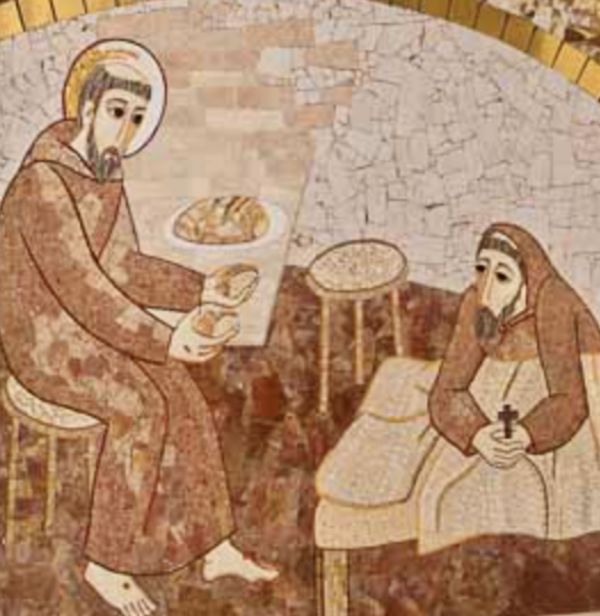In the life of St Francis of Assisi, resting in God was tantamount to intruding time and space in intense prayer, which translated into practice with care and compassion for one's neighbour.
In the Sources we read:
"Prayer was his consolation when he gave himself to contemplation.
Prayer was also his defence when he gave himself to action, since, through insistence in prayer, he shunned, in all his actions, trusting in his own abilities, he put all his trust in divine goodness, casting his anxiety on the Lord.
The Poor Assisian loved to "abide" in Christ; to be with Him, to live by Him, nourished by His Holy Word, learning the "Life-Three" relationship in assiduous contemplation.
Indeed, he had well understood that to make room for the Image of Jesus in him, he had to remain in His Love.
The Sources illustrate well the search for this Conformation of his:
"He spent all his time in holy recollection to imprint Wisdom in his heart.
He feared going back if he did not always progress. And if at times there were urgent visits from seculars or other matters, he would cut them off rather than finish them, in order to take refuge again in contemplation.
Thus, by "abiding" in Christ, Francis bore much fruit!
Walking and sitting at home and away, working and resting, he remained so intent on prayer that he seemed to have devoted every part of himself to it, not only his heart and body, but also his activity and time" (Sources 1176).
"The tireless dedication to prayer [...] had brought the man of God to such clarity of spirit that [...] he scrutinised the depths of Scripture with a clear and sharp intellect. He read the sacred books and kept tenaciously imprinted in his memory what he had once assimilated: for he continually ruminated with affectionate devotion what he had listened to with an attentive mind' (Sources 1187).
And he was full of compassion towards the labours and needs of others, so much so that the Sources inform us:
"It was summertime, and the countryman who followed the Saint climbing mountain paths was dead tired from the harshness and length of the journey. Suddenly, before reaching the hermitage, he felt himself parched with thirst. He began to cry out after the Saint, begging him to have mercy on him, for without the comfort of a little water he would certainly have died.
The Saint, always compassionate towards the afflicted, leapt from the donkey, and kneeling on the ground raised his hands to heaven and did not cease to pray until he felt he had been granted.
"Go quickly," he cried to the farmer, "there you will find living water, which the merciful Christ has now brought forth from the rock to quench your thirst.
The man drank the water that had gushed forth from the rock because of his prayer and quenched his thirst at the hard flint. There had never been a stream of water in that place, nor was it found afterwards, however many searches were made" (Sources 632).
Moreover, like Jesus, Francis also took to heart the multitude who followed him:
"When, with the passage of time, the brothers had become very numerous, the thoughtful pastor began to gather them together in the place of St. Mary of the Portiuncula for the general chapter, in which he could assign to each one of them a portion of obedience in the kingdom of the poor, according to the measure willed by God.
At the Portiuncula there was a shortage of everything; but, although at times a multitude of more than five thousand brothers gathered there, the help of the divine Goodness was never lacking, who provided enough for all and granted to all health of body and superabundant joy of spirit" (Sources 1080).












